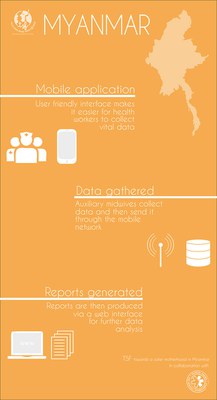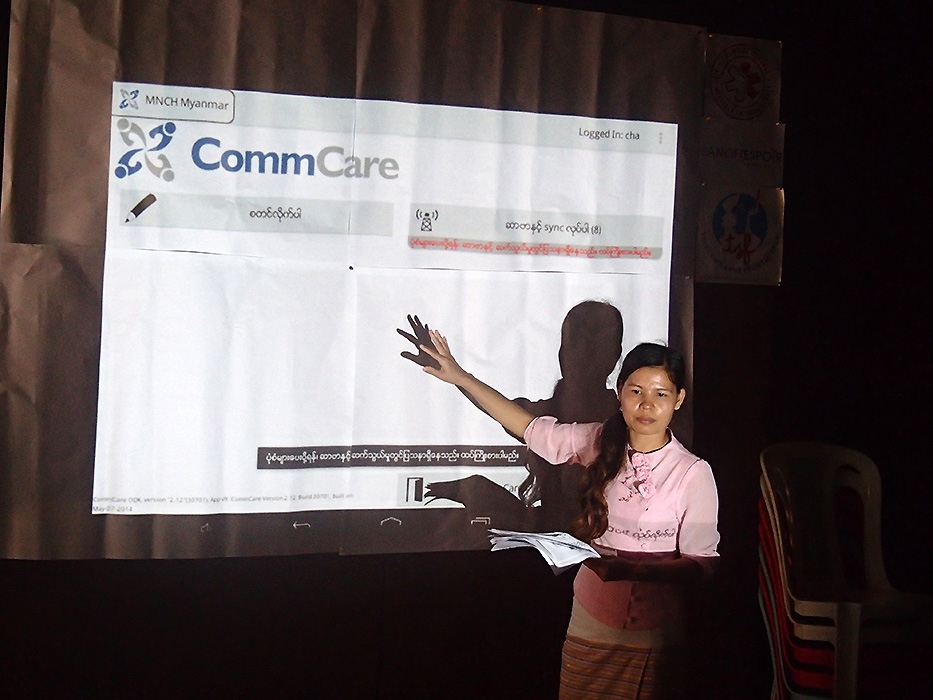Mobile technology to reinforce maternal healthcare
Context: Maternal and infant healthcare
Start date: 01/10/2013
End date: 01/10/2015
Areas of intervention: 2 cities in the State of Kayin
- Dala
- Kawkareik
Activities: mHealth
45 midwives
84 assistant midwives
Context
Myanmar has a very low number of skilled maternity workers, and many women rely on traditional birth attendance practices which can prove dangerous for future mothers. In 2014, maternal mortality rate in Myanmar was at 282 per 100,000 births, a lot higher than the 230 observed in developed countries.
In order to compensate for this lack of personnel, the government and the NGO Première Urgence Internationale (PUI) implemented a training programme for auxiliary midwives. Those community-based health workers were often working in isolation in remote areas where they faced unique challenges, such as the lack of daily monitoring and the lack of reliability of medical data hindering patient surveillance.
While the issues were present all over the country, TSF and PUI chose to start the implementation within the Kayin State, home to the vulnerable Karen people. The Karen is an ethnic group making up approximately 7% of the total population. The have waged a war against the central Burmese government since 1949 aiming for independence. Fleeing violence as well as looking for better health care facilities, many have fled to the neighbouring Thailand.
In 2013, Myanmar opened its borders to international investors. Amongst other benefits for the country, this resulted in telecoms operators considerably developing the mobile and Internet infrastructures. By extending coverage and reducing prices tenfold – for example sim card went from $40 to $1 – telecommunication was made more affordable to the population.
The endless possibilities of mobile communication technologies opened up the potential for humanitarian projects.
Implementation
After assessing the situation, TSF and PUI decided to develop programme based on an innovate approach that uses information and communication technologies (ICT) to reinforce the quality of maternal and child cares.
As PUI launched its “Towards a safer motherhood” programme in September 2013, TSF developed a mobile solution to support and strengthen auxiliary midwives (AMW) throughout the course of antenatal consultations.
mHealth
The solution developed by TSF allows:
- patients’ information to be shared amongst AMW;
- patient follow-up to be streamlined;
- communications to be improved between AMW and their local health centres for faster referrals.
The project aims to strengthen the capacities of local auxiliary midwives by facilitating the monitoring of the pregnancy and diagnosis of diseases such as malaria which commonly threaten both mother and child in Myanmar.
The data is gathered using smartphones and send through the mobile telecommunications network to a data server where all this essential information was centralised.
The solution uses digital forms to allow structured and accurate data reports to be produced and analysed by healthcare workers. Those reports help improving the quality of care to the mothers who need it most.
Furthermore, the application treats each case separately, allowing the user to create profiles for every patient. Auxiliary midwives are then guided through various questions concerning their patients’ pregnancy and any illnesses they may encounter, the result being a diagnosis or medical recommendations.
In total, 45 midwives and 84 midwives assistants were supported by this project in the Kayin and Dala districts.






















